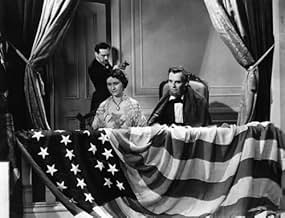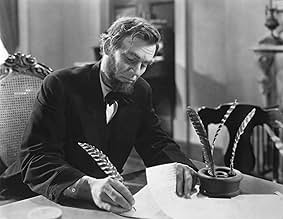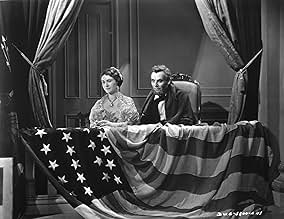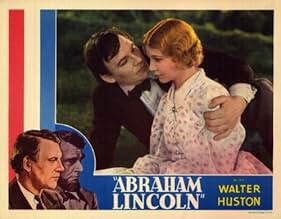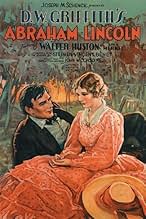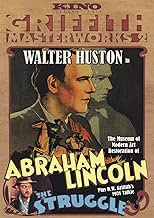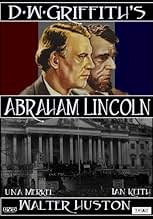PUNTUACIÓN EN IMDb
5,7/10
1,8 mil
TU PUNTUACIÓN
Una biografía episódica del 16º Presidente de los Estados Unidos.Una biografía episódica del 16º Presidente de los Estados Unidos.Una biografía episódica del 16º Presidente de los Estados Unidos.
- Dirección
- Guión
- Reparto principal
- Premios
- 4 premios en total
William L. Thorne
- Tom Lincoln
- (as W.L. Thorne)
Edgar Dearing
- Armstrong
- (as Edgar Deering)
Jason Robards Sr.
- Herndon
- (as Jason Robards)
Cameron Prud'Homme
- John Hay - Secretary to the President
- (as Cameron Prudhomme)
James Eagles
- Young Soldier
- (as Jimmie Eagle)
Reseñas destacadas
This film was to be D.W. Griffith's big comeback production, and it did very well for "the old master." In fact, it was chosen as number two of the Ten Best Pictures of 1930 by The Film Daily, just below "All Quiet On The Western Front!" Sadly, due to the horrible condition of the available prints of this film, no really fair analysis can be made today. As with so many early talkies, Abraham Lincoln is now a sickly shadow of what it was in 1930. To begin with, it's original running time is listed at approximately 96 minutes. The version presented on Laserdisc runs 83 minutes.The film shows signs of wear and duping. The soundtrack is horribly distorted and, in several scenes, seems to be missing totally, replaced by terrible music from a stock library. Even so, if one can look past these things and take the acting style in the context of its time, one can see that Griffith had not lost his flair and would have probably continued directing had the fates (and probably Hollywood) not conspired against him. There are wonderful cinematic moments, reminiscent of some of his earlier triumphs. This is a film that cries out for restoration but, alas, there is most likely little or nothing left to restore. UPDATE: In 2008, KINO International released a DVD version of Abraham Lincoln that is far more complete than the old Laserdisc I reviewed from in 1998. While some soundtrack from the Prologue is still missing, KINO has made up for it by adding subtitles for the missing dialogue. Also, the picture quality is far superior to anything else available. It is evident that much effort went into making this forgotten film much more watchable and available!
Before writing this review I saw that publicity driven line about this film. Abraham Lincoln is a lot of things, but NOBODY ever accused him of being a great romantic. All I can say there is, Huh?
Abraham Lincoln is one of two sound films made by movie pioneer, David W. Griffith. It's also something of an atonement for Griffith who was accused fostering racism with his masterpiece silent work, The Birth of a Nation.
Maybe if Abraham Lincoln had been a better film it would have succeeded in being an atonement. It certainly had one of the best interpreters of Lincoln ever in Walter Huston. The film also in many ways looks like a newsreel of the Civil War era. Our image of that era and you can see it in Ken Burns documentary comes from Matthew Brady's still photographs. In crafting this and The Birth of a Nation, Griffith was heavily influenced by Brady's still photographs.
Lincoln's prarie years were better told in Abe Lincoln in Illinois and Young Mr. Lincoln. Griffith should have stuck to the war years and made it in fact the Lincoln family story. One thing that would have done is eliminated Una Merkel as Ann Rutledge. Una Merkel had many a good role as a wisecracking dame in modern films. But in Abraham Lincoln she's just awful as Lincoln's lost love Ann Rutledge. It's a miracle she had a career after this film and a good one.
Abraham Lincoln is one of two sound films made by movie pioneer, David W. Griffith. It's also something of an atonement for Griffith who was accused fostering racism with his masterpiece silent work, The Birth of a Nation.
Maybe if Abraham Lincoln had been a better film it would have succeeded in being an atonement. It certainly had one of the best interpreters of Lincoln ever in Walter Huston. The film also in many ways looks like a newsreel of the Civil War era. Our image of that era and you can see it in Ken Burns documentary comes from Matthew Brady's still photographs. In crafting this and The Birth of a Nation, Griffith was heavily influenced by Brady's still photographs.
Lincoln's prarie years were better told in Abe Lincoln in Illinois and Young Mr. Lincoln. Griffith should have stuck to the war years and made it in fact the Lincoln family story. One thing that would have done is eliminated Una Merkel as Ann Rutledge. Una Merkel had many a good role as a wisecracking dame in modern films. But in Abraham Lincoln she's just awful as Lincoln's lost love Ann Rutledge. It's a miracle she had a career after this film and a good one.
It seems incredible the leaps and bounds that were made in less than ten years of cinema back some 90 years ago. D W Griffith's portrait of the great, noble pioneer in U.S politics has all the standard techniques and flourishes that now seem to have become the norm.
Walter Houston looks to be perfectly cast as 'Abe' - towering and dominant without being domineering and having that air of quiet authority. That he was humanitarian and resisted conflict whenever able to. It was nice also to have wife Mary's domestic quibbles thrown in, making this an interesting character study rather than a stiff history lesson.
As for history, no, I didn't learn a great deal, but didn't expect to. I wanted more to see how one of the great pioneering film directors portrayed another Great Man. The wonderfully produced epitaph in the final seconds showed testament to the power of them both.
Yes, the film's sound is hissy and pretty scratchy (I viewed it on-line at Internet Archive) but compared to most movies, certainly of that era and posted on that site, I found it surprisingly enjoyable and effortless.
Walter Houston looks to be perfectly cast as 'Abe' - towering and dominant without being domineering and having that air of quiet authority. That he was humanitarian and resisted conflict whenever able to. It was nice also to have wife Mary's domestic quibbles thrown in, making this an interesting character study rather than a stiff history lesson.
As for history, no, I didn't learn a great deal, but didn't expect to. I wanted more to see how one of the great pioneering film directors portrayed another Great Man. The wonderfully produced epitaph in the final seconds showed testament to the power of them both.
Yes, the film's sound is hissy and pretty scratchy (I viewed it on-line at Internet Archive) but compared to most movies, certainly of that era and posted on that site, I found it surprisingly enjoyable and effortless.
No doubt about it, D.W. Griffith was one of the great directors of the early silent era. "Birth of a Nation," "Intolerance," "Orphans of the Storm," even a lesser-known film like "The Musketeers of Pig Alley" are all now regarded as classics. Unfortunately, for whatever reasons, Griffith couldn't maintain his success record, and, by the time he made his first all-talking film, "Abraham Lincoln," he was in the midst of a major slump that he just couldn't pull out of. The film is static, stilted, and moves at a snail's pace. Walter Huston, Ian Keith, Henry B. Walthall, and most of the rest of the cast all had distinguished careers in sound films, but here they are merely wasted, unable to cope with the tedious dialogue and Griffith's uncharacteristicly stiff direction. Worst-served of all, though, is Una Merkel, here in one of her first films. I can't believe that Anne Rutlidge could have been such a sugary simp as we're led to believe by her performance here, and her death scene is only exceeded for bathos by Ali McGraw in the last scene of "Love Story." In sum, a major disappointment, a good cast wasted, and a sad farewell form one of American film's true pioneers. Griffith described making this film as "a nightmare of the mind and nerves," and, unfortunately, that's just what it is, for him and us.
Walter Huston gets an A for effort, his performance is certainly far too melodramatic, but he clearly put a lot of heart and soul into it. Besides, the melodrama is more the fault of director D.W. Griffith, who seems to have lost his touch with his talkie films. Very patriotic,not particularly well produced. It falls among those films that were in the transition from silent to sound and have that awkwardness about them. The art direction is rather peculiarly phony looking, and that last shot of the Lincoln Memorial, it seems it would have been cheaper and easier just to get actual footage of the monument itself, rather than to make that phony looking model
¿Sabías que...?
- CuriosidadesThis was D.W. Griffith's first sound film. Abraham Lincoln (1930) was also the first sound film about the Civil War which veterans of that war could view.
- PifiasIn both the Union and Confederate parades, the musicians play trombones with forward facing bells. During the Civil War, the bells faced backwards.
- Citas
[death scene]
Ann Rutledge: I know the truth, dear. It's goodbye.
Abraham Lincoln: No, no, Ann, dear. You're not going to leave me. I won't let you!
Ann Rutledge: We must be brave, dear...
[looking up to the heavens]
Ann Rutledge: Don't take me away. Don't take me away! It's so dark and lonesome!
Abraham Lincoln: Ann, you mustn't let go.
Ann Rutledge: If they'd sing, I wouldn't be so afraid.
[a chorus of "Sweet By and By" swells up in the background]
Ann Rutledge: We will meet there, dear.
- Versiones alternativasOriginally, this film was color-tinted in sepia-tone, with blue for night scenes. These prints also had a prologue. Current public-domain prints are in black and white, minus the prologue with a shorter running time.
- ConexionesEdited into General Spanky (1936)
- Banda sonoraBattle Hymn of the Republic
(ca 1856) (uncredited)
Music by William Steffe
Lyrics by Julia Ward Howe (1862)
Played during the opening credits and often in the score
Sung by an offscreen chorus during a civil war scene
Selecciones populares
Inicia sesión para calificar y añadir a tu lista para recibir recomendaciones personalizadas
- How long is Abraham Lincoln?Con tecnología de Alexa
Detalles
- Duración
- 1h 36min(96 min)
- Color
- Relación de aspecto
- 1.20 : 1
Contribuir a esta página
Sugerir un cambio o añadir el contenido que falta

